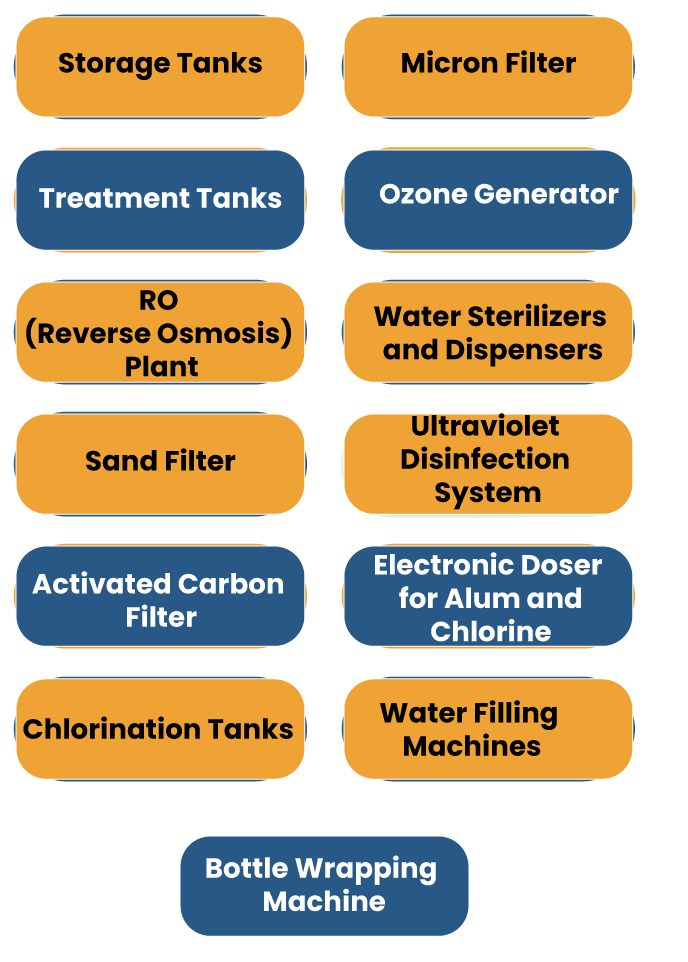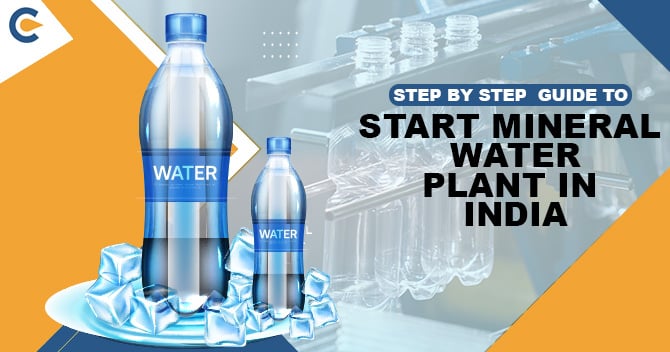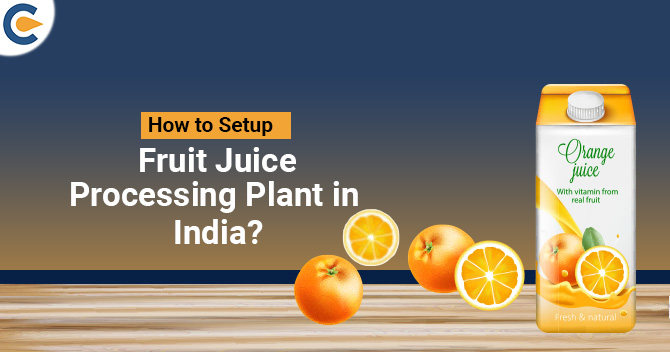The demand for Mineral water has been reached to an incredible level today. In contrast to regular potable water, masses are now preferred buying mineral water because of its ultimate purity and hygiene. The ever-rising demand for mineral water disrupts the overall supply chain, putting more pressure on the existing plant to crank up the production. This surging demand is attracting new entrepreneurs to set up mineral water plants in India. The great thing about this business model is that it doesn’t seek significant investment and ensure long-term profitability for the owner. The write-up covers all critical aspects for establishing a legally viable mineral water plant in India.
Packaged Drinking Water Vs Mineral Water Plant
Packaged drinking water is water derived from any source of drinking water that might be exposed to different stages of the filtration process, including cartridge filter, activated carbon filtration, or any other method to fulfil the underlying norms and packed. It may undergo disinfect process to a level that will not trigger harmful contamination in the drinking water. The potable water utilized for producing packaged drinking water derived from different sources (borewells, public drinking water systems, etc.) is received regularly. Supplies of potable water via pipeline would be acceptable if the source remains the same.
Mineral water plant requires the water coming from naturally occurring sources like mountain water and spring water. Such water involves minerals that offer innumerable health-related benefits to humans. Calcium, sodium, potassium, magnesium, etc are a few such minerals generally found in mineral water.
Read our article:FSSAI Standards for Packaged Drinking Water under Bromate Proposal
Growth Prospect of Mineral Water Plant Business in India
- In India, the consumption of bottled water is primarily due to the absence of safe potable water because of a massive rise in the population, the inflow of overseas students & tourists, poor water of tap water and rise of health awareness.
- As the Indian government has struggled to facilitate pure drinking water, private entities have not just filled the gap but also underpinned a robust business. The mainstream water entities in India are stressing on increasing their market share by leveraging effective market strategies & attractive packaging.
- The market has a valuation of Rs 160 billion in FY 2018, and it is projected to grow @ 20.7% (CAGR) and reach Rs ~403.06 billion by 2023.
- The 1L bottle captured almost 14% of the market share in FY 2018, followed by 500 ml bottles & 250 ml bottles. Depending on the volume, the market is expected to reach 35.53 billion litres by 2023, thriving at a CAGR of 18.2% from 2018 to 2023.
- In the recent past, the Flavoured bottled drinking water has witnessed a sharp spike in demand all accords the nation. Different kinds of flavoured water containing artificial sweeteners, fruit essence, and other sweetened beverages serve as a substitute to plain bottled water. End-users prefer these products over normal bottled water sometimes. This shift is garnering an opportunity to widen the product line of bottled water manufacturers in India.
- Mineral water has become an indispensable requirement for masses these days, which in turn creating a viable business opportunity for new entrepreneurs. The escalating consumption makes the mineral water industry one of the successful ventures for start-ups in India.
Blueprint to Setup Mineral Water Plant Business in India
The section below facilitates a detailed step by step guide of establishing mineral water plant in India:
Select an Apt location for Mineral plant business
Establishing a workable mineral water plant seeks a minimum space of 1000 sq ft. The layout of the same should be tweaked in accordance with the equipment to be used in the process to maximize efficacy. If possible, select the location that comes in close proximity to the marketing distribution areas. This way, it will become easier for you to reduce the overall transportation cost.
Procure required machinery and raw material
Different types of equipment are utilized in mineral water processing plants. You need to opt for the right set of machinery as per your budget and desired packaging. There is an option for semi-automatic machinery and fully automatic machinery; go for the one that fits perfectly into your budget and help you achieve your desired goal.
Below is the list of common machinery that being used in a mineral water plant business:


The typical raw material required at the water purification plant
- Reagents
- Bottles
- Chemical
- Bottle caps
- Cartons
- Pouches
Obtain Mandatory Licenses and Registration
Any business establishment, either small or big, seek different licenses and government permits to undertake their operation. The licences requirement list may differ based on different state governments. Thus, it is advisable to determine the state government laws.
Registration of firm/Company incorporation
- The company incorporation is a legal process that is utilized to form a company or a corporate entity. An incorporated company serves as an independent legal establishment that is recognized by the law.
- These corporations can be acknowledged with the like ‘Limited’ or ‘Inc’ in their names. It becomes a legal entity entirely independent from its owners.
- The difference between registration & incorporation should be understood when establishing a business. Both are viable alternatives for making the business legal. The primary difference is that incorporation imparts a status of an independent legal entity. Creating a corporation also safeguards the owner from compromising personal assets in case of insolvency or legal disputes.
- Unlike company incorporation, Business registration does not facilitate the same protection for personal assets. The reason you register an entity is more for the business license, which is required to operate in some areas.
ISI certification issued by the Bureau of Indian Standards (BIS)
The ISI mark refers to a standards-compliance mark for particular products in India since 1955. The mark ensures that the product aligns with the Indian standard (IS) underpinned by BIS, an apex government body. For some products, ISO marks are not mandatory.
Most of the norms are required to be fulfilled with the BIS and its provisions. It is mandated by GOI to avail BIS certification for the Mineral Water Plant. In India, for potable drinking water, it is compulsory to get it tested in accordance with the BIS norms
Key point to ponder:
- Upon filing e-form for the BIS certification, the officials from BIS will inspect the plant for compliances. During on-site visit, they may pick up some sample of water for testing.
Test reports of raw and processed water
Once you availed the BIS license, you are also need to obtain a report on raw as well as processed water from BIS. To serve such a purpose, you need to head over to LWTL (Local Water Testing Laboratory).
Food license from the Food Safety and Standard Authority of India
FSSAI safety and standard authority of India has underpinned some stringent norms for mineral water plants in India. The authority is imposing harsh penalties on those operating without a food license. Thus, availing food license is a legal compulsion for the packaged water plant in India.
Small Scale Industry (SSI) Registration
SSI registration is an essential for the growth of the small scale industries in India. Thus, in order to access various benefits of government subsidies, you must apply for this registration.
Pollution control certificate from SPCB
The state pollution control board grants pollution control certificate against a duly filed e-application and softcopy of the following documents:
- Firm registration or company incorporation certificate
- Number of DG sets at the plant along with their power rating
- Detail of equipment along with their power rating
- Plant schematic attested by the required personal
Other Key certifications
- Degree and medical certificate for officials involved with process of water filtration.
- Microbiologist – degree and medical certificate for testing personals.
- Medical certificate for workers
- N.O.C. from Gram panchayat
Other Essential Compliances for Mineral Water Plant
- Prevention of Food Adulteration Act 1954: The Act talks about the protection of the interest of end-users by keeping constant probe on the food and beverage sector.
- The Ministry of Water Resources[1], Central Ground Water Authority (CGWA) regulates the ground water use in India.
- In the purview of Section 5 of Environment [protection] Act, 1986, CGWA has mandated all the packaged water units to obtain the bore well registration in accordance with the prescribed Performa.
FSSAI standards for mineral water plant
- The mineral water plant must align with the given standards underpinned by the FSSAI:
- The mineral water is required to undergo a various phase of treatment such as;
- Decantation
- Filtration
- A combination of filtration
- Aerations
- Filtration with membrane filter depth filter
- Cartridge filter
- Activated carbon filtration
- Demineralization
- Re-mineralization
- Reverse osmosis
- The packagers must ensure that the mineral water is entirely disinfected via chemical agents or physical methods. During such treatment, the packager has to keep the level of microorganisms below the scientifically accepted level to ensure safe production.
- Packagers must leverage the desalinization process for the treatment of seawater.
- Sealed containers of several compositions, capacities & forms must be used which are safe for direct consumption.
- Where the water is subject to a re-mineralization process, the ingredients utilized will need to conform to food-grade as well as pharma-grade quality.
A Typical Purification Process take place in the Mineral Water Plant
Step 1 – Accum Water
Raw water is pumped to the storage tanks, and then it is dozed with alum for coagulation with heavy metals and insoluble matters,
Step 2 – Discard Impurities
Wait for an hour until the water settles completely onto the tank’s floor. Next, the osmosis technique is used to get rid of the impurities present in water.
Step 3 – Bubbling Chlorine Gas Processes
Then the purified water is pumped to the chlorination tank, where disinfection is initiated by bubbling chlorine gas process.
Step 4 – Sand Filteration
As the name suggests, the water is passed through sand filtration, where the undissolved impurities get trapped in this phase.
Step 5 – Carbon Filteration
Then removal of odour, colour and dechlorination come into action via carbon filtration.
Step 6 – Micro Filters
In this phase, the water is passed via the microfilters for final disinfection, followed by the ultraviolet disinfection system.
Step 7 – Bottle Filling
In this phase, the mineral water is pumped through a bottle filing equipment and then further sent to the capping equipment, where bottles are sealed with caps via an ozone generator.
Step 8 – Packaging
Finally, the mineral water is packed for transportation and selling.
Conclusion
Production of mineral water is a complicated process where the raw water undergoes various filtrations and disinfects process stages. The cost of setting up a mineral water plant is also proportional to the volume of pure water you wish to produce. Therefore, it is advisable to dig down and avail more clarity on your business goal before pouring your hard-earned money into this venture.
Read our article:Packaged Drinking Water Business In India











